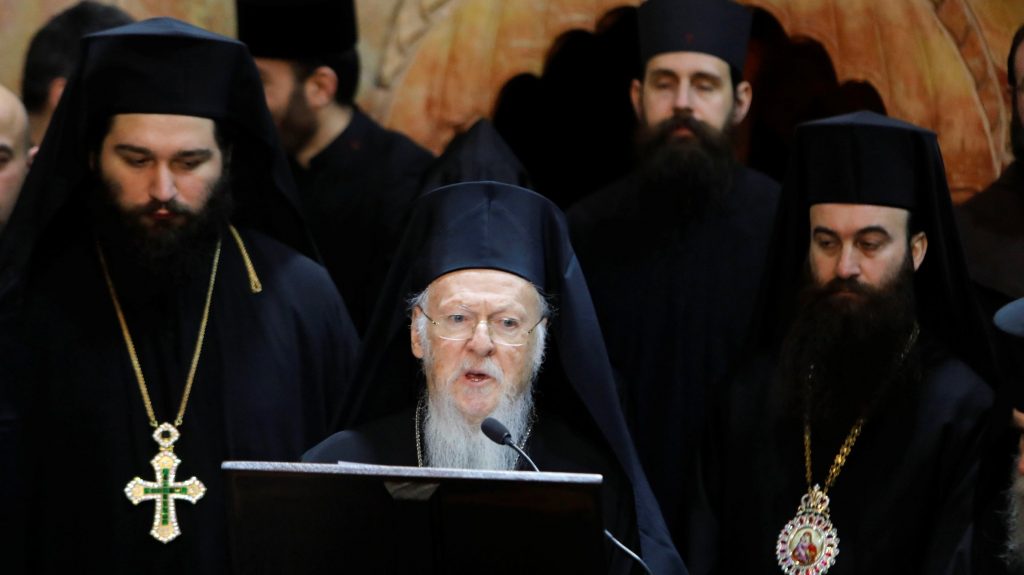Faith leaders around the world need to raise their voice against structural inequalities as the COVID-19 pandemic widens the gap between rich and poor, said Ecumenical Patriarch Bartholomew of Constantinople.
"Policymakers and implementers need to know that we call for zero tolerance of injustice and any form of discriminatory practice," he said, noting that "this year we have been witnessing the rise of the Black Lives Matter movement in the United States."
The patriarch spoke at an Oct. 13-17 meeting of leaders and representatives of major religions and global policy institutions streamed from Saudi Arabia's capital, Riyadh.
The forum was organized by the G-20 Interfaith Forum Association, the KAICIID International Dialogue Centre, the U.N. Alliance of Civilizations and the National Committee for Interreligious and Intercultural Dialogue in the Kingdom of Saudi Arabia.
Saudi Arabia currently holds the presidency of the Group of 20, made up of representatives of industrial and emerging-market nations.
Patriarch Bartholomew also called for support for a U.N. plan of action to safeguard sacred sites, noting that these sites "are closely tied to our religious identity."
"Such treasured places can become weapons or targets in spreading ethnic and religious intolerance," he said at the Oct. 13 opening plenary.
Cardinal Miguel Ayuso Guixot, president of the Pontifical Council for Interreligious Dialogue, told the forum that interreligious dialogue has a crucial function in building a "more efficient world organization."
The human family needs to "come together with a unified spirit to propose answers to our common problems," he said.
While there is a "temptation to limit fraternity and participation to those with the same religion," universal dialogue "is essential if we are to end the crisis" of COVID-19 and prevent another, he said.
Javier Martinez-Torron, a law professor of law from Madrid, said states, religious leaders and civil society have a responsibility to "emphasize the positive aspects of freedom of religion and belief."
"A surprising number of people in the world do not understand the right" to freedom of belief "and so it has to be taught," he told an Oct. 16 panel on the rule of law, human rights and religious rights.
Where perpetrators claim their hate crimes and hate speech are based on a particular belief, it is the responsibility of the leaders of that religion "to speak out and discredit" them, Martinez-Torron said.
"It is an uncomfortable role, but they have to do it," he said, noting that it is the leaders' "responsibility to take the reins, not just to watch from the sidelines" when hate crimes are committed.
Elizabeta Kitanovic of the Brussels-based Conference of European Churches said that "with goodwill and hard work, religious leaders can help in eradicating hate speech and hate crime in our society."
"Interfaith solidarity is important," she said, noting that leaders of different faiths "need to stand up for each other."
More protection of the rights of religious minorities is needed internationally, she said.
Armenian Apostolic Catholicos Aram of Cilicia said the role of religion is largely "defined as being responders to disasters" and this view must be challenged.
Faith communities "are primarily preventers and only then responders" to crises, he said, noting that "as an essential part of civil society and a major player in disaster risk reduction," they "must be taken more seriously by civil authorities."
"Effective prevention entails handling the root causes of a problem, not just its symptoms," the Lebanon-based Armenian Orthodox patriarch told the forum Oct. 17.
With climate change, the "role of religion is pivotal," he said. With their broad networks, faith communities can go beyond humanitarian assistance by setting up early-warning systems, "growing broader partnerships at grassroots level," running "people-oriented education" programs, and working for justice as well as healing.
Cardinal Matteo Zuppi of Bologna, Italy, where the 2021 forum is scheduled to be held, said religions are united by values such as mutual respect.
People of different faiths "need to develop a stronger and fuller understanding of the other" and of "the essential aspects that allow us to walk together," he said in the Oct. 17 closing plenary.
Michael O'Flaherty, director of the Vienna-based European Union Agency for Fundamental Rights, noted a "need for all of us to invest in building a more diverse, respectful society." For this to happen, voices of religious communities must be "given a more respected place," he said.
"We have to invest in spaces to dialogue" and set these up formally, O'Flaherty told the forum Oct. 16.
"Within these spaces, we need to learn more about each other," he said, noting also that "faith communities could do more to develop a literacy around human rights protections."
To stop multinational exploitation of vulnerable people, "we need to take away the profit," Kevin Hyland, adviser to the Catholic Bishops' Conference of England and Wales, said in a panel discussion on human trafficking and modern slavery.
The common practice of migrants paying recruitment agencies "very large sums" to work in other countries must be stopped, said Hyland, who was the United Kingdom's first independent anti-slavery commissioner. Also, ways for migrants to access bank accounts must be found so that they are "able to use their own money to put food on the table" for their families, he said.

